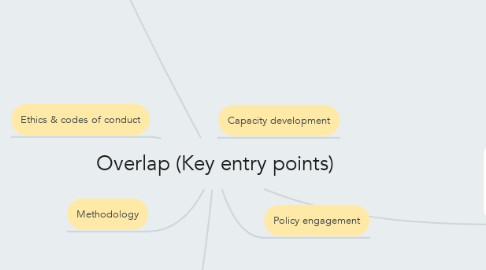
1. Donors
1.1. Donor types
1.1.1. Private
1.1.1.1. Carnegie Corporation
1.1.1.2. Mastercard Foundation
1.1.2. Public
1.2. Research Questions
1.2.1. Sub-Questions
1.2.1.1. How do donor procedures influence the work of southern research institutions and research projects in politically fragile research ecosystems? What donor modalities exist that enable southern researchers to access existing research networks allow researchers not only to circumvent or overcome constraints in difficult contexts, but that also – over the long-term – result in more robust and resilient research environments, locally-driven research agendas, strengthened research-to-policy processes/evidence-based decision making, etc.? What trade-offs are made?
1.2.2. Operationalized
1.2.2.1. -What are the key procedures and requirements of donors that drive the way they select and engage with southern research institutions and research projects in politically fragile research ecosystems?
1.2.2.2. How do donors reflect on their impact on the context and on building knowledge ecosystems, and to what extent are these lessons incorporated into funding modality design?
1.2.2.3. -To what extent are donors able to modify their funding policies, procedures, and requirements to enable southern research projects to evolve according to constraints imposed by fragility?
1.2.3. Conceptual Themes
1.2.3.1. Authority
1.2.3.2. Accountability
1.2.3.3. Agility & problem solving
1.2.3.4. Reflexivity
1.2.3.5. Liability
1.2.3.6. Agenda setting
1.2.4. Empirical Topics (Donor procedures)
1.2.4.1. Risk assessments
1.2.4.2. Safety protocols
1.2.4.3. Grant ellgibility
1.2.4.4. Reporting requirements
1.2.4.5. Funding modalities
1.2.4.5.1. Competitive vs. targeted grants; scholarships; scholars at risk; capacity-building grants; research consortium and partnerships, travel grants
1.2.5. Methods of Data Collection & Analysis
1.2.5.1. Surveys, participatory workshops, interviews
1.2.5.2. Thematic, content, comparative analysis
2. Projects
2.1. Design Elements
2.1.1. Methodologies
2.1.2. Ethics & codes of conduct
2.1.3. Capacity development approaches
2.1.4. Policy engagement strategies
2.1.5. Composition and governance approaches
2.1.5.1. consortiums
2.1.5.2. south-south networks
2.1.5.3. fellowships
2.2. Research Questions
2.2.1. What kinds of partnerships and approaches are best suited to which types of research contexts? What trade offs are inherent in these choices?
2.2.1.1. Operationalized
2.2.1.1.1. What are the best practices for North-South and South-South research capacity strengthening mechanisms and networks in contexts of fragility?
2.2.1.1.2. To what extent are south-south peer learning networks enabling research-to-policy efforts across different research contexts? What sort of donor funding modalities support these networks?
2.2.1.2. Conceptual Themes
2.2.1.2.1. Localized knowledge
2.2.1.2.2. Autonomy
2.2.1.2.3. Flexibility
2.2.1.3. Empirical Topics
2.2.1.3.1. Methodologies
2.2.1.3.2. Ethics and codes of conduct
2.2.1.3.3. Capacity development approaches
2.2.1.3.4. Policy engagement strategies
2.2.1.3.5. Composition and governance of different approaches
3. Methodology
4. Ethics & codes of conduct
5. Southern Research Institutions
5.1. Research Questions
5.1.1. What are the effective strategies that Southern research institutions take in different contexts of fragility to build their long-term capacity to produce quality research and influence policy? What trade-offs do they make?
5.1.1.1. Operationalized
5.1.1.1.1. What strategies do research institutions employ to achieve their organizational mandate in the research they produce?
5.1.1.1.2. What do research institutions believe they have achieved in the research they have produced? What funding modalities minimize constraints and maximize the ability of southern researchers and their networks to promote the development of a stronger knowledge?
5.1.1.2. Conceptual themes
5.1.1.3. Empirical topics
5.1.1.3.1. Transparency mechanisms
5.1.1.3.2. Positioning/influencing strategies
5.1.1.3.3. Security policies
5.1.1.3.4. Human resource strategies (i.e. hiring, capacity building)
5.1.1.3.5. Methodological/data collection strategies
5.2. Strategies
5.2.1. Transparency and accountability
5.2.2. Positioning/influencing strategies
5.2.3. Security policies
5.2.4. Human resources strategies (hiring, capacity building)
5.2.5. Sustainability strategies
5.2.6. Methodological/data collection strategies
